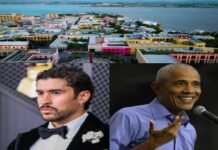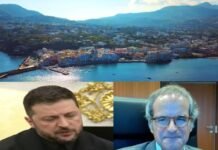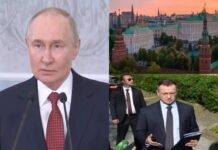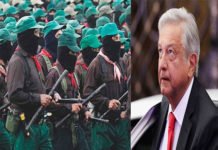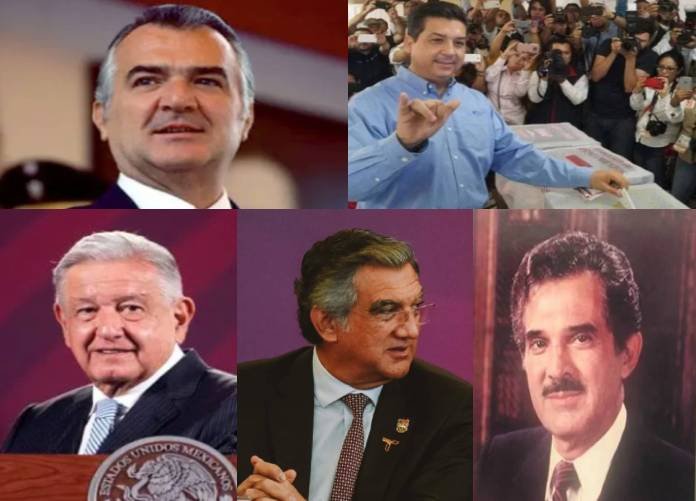*** “Labyrinths of Power”, in MEXICO
*** Latin America, Studied by PETER H. SMITH
*** DE LA MADRID, its Scandalous Corruption
*** The Godfather of AMERICO Was DE LA MADRID
***Pay Attention Please: Translation From English to Spanish by MARY DE LA RIVERA.
By DANTE GONZALEZ / Special to The UNIVERSE News And EL UNIVERSO.
Dallas, TEXAS.- PETER H. SMITH -caused- an enormous commotion in the national political class. For -stripped- the corrupt Mexican political system, by publishing in 1979, his book about Mexico: “Labyrinths of Power”.
In 2024, once again President ANDRES MANUEL LOPEZ OBRADOR severely prosecutes former Mexican Presidents, who for 36 years have seriously damaged the State. The Which made reforms to the Constitution to -legalize- the looting of the nation.
But, Who is PETER HOPKINSON SMITH?. He (born January 17, 1940) is a scholar of Latin American history, politics, economics, and diplomacy. Whose studies are rigorously scientific, specially in sociopolitical matters.
He is a distinguished Professor Emeritus of Political Science, and the Simon Bolivar Professor of Latin American Studies at University of California in San Diego.
He previously served as a professor of history and Department chairman at the University of Wisconsin, Madison, and as professor and dean at the Massachusetts Institute of Technology.
His books have appeared in numerous editions and have been translated into Spanish, Portuguese, Korean, and Chinese. Some of his publications include:
- Politics and Beef in Argentina: Patterns of Conflict and Change (1969).
- Argentina and the Failure of Democracy: Conflict among Political Elites, 1904-1955 (1974).
- Labyrinths of Power: Political Recruitment in Twentieth-Century Mexico (1979).
- Talons of the Eagle: Dynamics of U.S.-Latin American Relations (1996; 2nd edition, 2000).
- Democracy in Latin America: Political Change in Comparative Perspective (2005).
- Modern Latin America, co-authored (1984), now in its ninth edition (2018)
- Drug Policy in the Americas, edited (1992).
- Latin America in Comparative Perspective: New Approaches to Methods and Analysis, edited (1995)
- NAFTA in the New Millennium, edited (2002).
- East Asia and Latin America: The Unlikely Alliance, edited (2003).
- Promises of Empowerment: Women in Asia and Latin America, edited (2004).
SMITH’s major studies regarding politics, democracy and globalization have been subjects of review essays in leading journals.
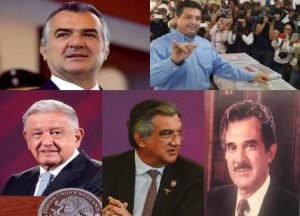
On PETER H. SMITH’s The “Labyrinths of Power”. We delineate some notes, which he analyzed: the change of continuity in the structures of political careers. We have to see that before the revolution the bureaucratic system was governed by a continuous -retention of power- in the same hands. Repetition” was ‘at’ the order of the day. The system was static, rigid and closed.
The revolution ushered in a completely different era. Careers became more flexible and people moved quickly across the interpositional board. Improvisation and diversity prevailed.
The flexible forms of advancement, were seen in that political career patterns, and recruitment processes showed signs of three distinct but closely related characteristics: professionalization, centralization, and bureaucratization.
But even when the post-revolutionary court acted in a tutelary regime, interpersonal mobility retained a sense of uncertainty and surprise.
Mexican politicians in the years after 1946 could never be confident that they would stay where they were.
The Mexican regime has many similarities with the authoritarian prototype designed by Juan J. Linz, who says: “as long as the elite remains relatively open, there are no established ways to access it, which frustrates the ambitions of many”.
The trajectories leading to power in Mexico, since 1946 are as obscure as they can be in other authoritarian regimes, necessarily contrasting with those prevailing in other types of systems.
In Mexico, there are no rules of any kind, nor are political careers uninformed. Rules exist, but they are different from those prevailing in many other places. There is no seniority system, nor is there a system of examinations, nor is there even a genuinely competitive electoral system.
A few days ago, President ANDRES MANUEL LOPEZ OBRADOR, in Mexico City, once again criticized past governments that legalized the looting of the State, from 1982 to 2018. At the Constitution ceremony, on February 5, 2024.
There, the Head of State estimates that there were Neoliberal Governments and that the reforms made to the Constitution only served to be against the people, harming the nation.
In that period, the following governed: MIGUEL DE LA MADRID (1982-1988), CARLOS SALINAS (1988-1994), ERNESTO ZEDILLO (1994-2000), VICENTE FOX, (2000-2006), FELIPE CALDERON (2006-2012) and ENRIQUE PEÑA NIETO (2012-2018), according to President LOPEZ OBRADOR.
Vices in Politics that began with the very corrupt MIGUEL DE LA MADRID HURTADO, with that flag of Moral Renewal. Doing the opposite before the eyes and ears of millions of Mexicans.
The UNIVERSE News and EL UNIVERSO interviewed several Tamaulipas natives living in Mexico, City. On the role that MIGUEL DE LA MADRID HURTADO played in the neoliberal era, which was a dark and harmful time for Mexico.
Knowing beforehand that these are issues that are linked to drug trafficking and organized crime. And to avoid deadly attacks and any kind of repression they prosecute under anonymity, in exchange for giving information. They argue:
“Look, things with MIGUEL DE LA MADRID and his government in six years, were totally scandalous. In which the U.S. Press brought him as a piñata. Since there were numerous corruption scandals and his alleged links with drug trafficking, which were spread in the U.S.”.
“Aside from protecting himself, he had to protect his secretaries of state, who formed his Cabinet. Even his Secretary of Defense was involved in drug trafficking and organized crime. At that time, CARLOS SALINAS was the Secretary of Programming and Budget.”
“That guardianship that DE LA MADRID felt, for taking care of his loved ones and friends. It was extended to the then Undersecretary of the SARH, AMERICO VILLARREAL GUERRA, who made him Senator, later Governor of Tamaulipas. Without having the merits to be in politics.”
“AMERICO VILLARREAL GUERRA, continued with the lessons of his godfather: MIGUEL DE LA MADRID HURTADO, who from Los Pinos practiced all kinds of immoralities and alleged crimes, which were not prosecuted. Today, his son AMERICO VILLARREAL ANAYA is in the same line.”
“AMERICO VILLARREAL ANAYA that during the campaign for Governor, the PAN and FRANCISCO JAVIER GARCIA CABEZA DE VACA never tired of attributing links to drug trafficking and the King of Huachicol. Now, Tamaulipas lives in convulsions due to Narco.”
AMÉRICO Supuestamente Vinculado a el “NARCO”
*** “Laberintos Del Poder”, en MÉXICO
*** América Latina, Estudiada Por PETER H. SMITH
*** DE LA MADRID, su Escandalosa Corrupción
*** El Padrino de AMÉRICO Fue DE LA MADRID
*** Traducción del Inglés al Español Por MARY DE LA RIVERA.
Por DANTE GONZÁLEZ / Especial Para The UNIVERSE News And EL UNIVERSO.
Dallas,TEXAS.- PETER H. SMITH -causó- una enorme conmoción, en la clase política nacional. Por -desnudar- el corrupto Sistema Político Mexicano, al divulgar en 1979, su libro sobre México: “ Laberintos del Poder”.
En 2024, nuevamente el Presidente ANDRES MANUEL LOPEZ OBRADOR enjuicia severamente a los ex Presidentes de México, que durante 36 años han dañado gravemente al Estado. Los cuales hicieron reformas a la Constitución -para legalizar- el saqueo de la nación.
Pero, ¿Quién es PETER HOPKINSON SMITH?. El (nació el 17 de enero de 1940) es un estudioso de la historia, la política, la economía y la diplomacia de América Latina. Cuyos estudios son rigurosamente científicos, especialmente en materia sociopolítica.
Él es Profesor Emérito de Ciencias Políticas y Catedrático Simón Bolívar de Estudios Latinoamericanos, en la Universidad de California, en San Diego.
Anteriormente, él se desempeñó como profesor de Historia y Presidente de departamento en la Universidad de Wisconsin, Madison y como Profesor y Decano en el Instituto Tecnológico de Massachusetts.
El señor SMITH es un gran escritor prolijo. Sus libros han aparecido en numerosas ediciones y han sido traducidos al español, portugués, coreano y chino. Algunas de sus publicaciones incluyen:
• Política y carne de vacuno en Argentina: patrones de conflicto y cambio (1969)
• Argentina y el fracaso de la democracia: conflicto entre élites políticas, 1904-1955 (1974)
• Laberintos de poder: reclutamiento político en el México del siglo XX (1979)
• Garras del águila: dinámica de las relaciones entre Estados Unidos y América Latina (1996; segunda edición, 2000)
• Democracia en América Latina: el cambio político en perspectiva comparada (2005)
• América Latina Moderna, en coautoría (1984), ahora en su novena edición (2018)
• Políticas de Drogas en las Américas, editado (1992)
• América Latina en perspectiva comparada: nuevos enfoques de métodos y análisis, editado (1995)
• TLCAN en el Nuevo Milenio, editado (2002)
• Asia Oriental y América Latina: La Alianza Improbable, editado (2003)
• Promesas de empoderamiento: mujeres en Asia y América Latina, editado (2004)
Los principales estudios de SMITH sobre política, democracia y globalización han sido objeto de ensayos de revisión en revistas importantes.
Sobre Los LABERINTOS DEL PODER de PETER H. SMITH deslizamos algunos apuntes, que el analizó: el cambio de la continuidad en las estructuras de las carreras políticas, tenemos que ver que antes de la revolución, el sistema burocrático estaba regido por una continua -retención del poder- en las mismas manos.“La repetición” estaba a la orden del día. El sistema era estático, rígido y cerrado.
La revolución marcó una época completamente diferente. Las carreras ganaron en flexibilidad y las personas se movían con rapidez en el tablero inter-posicional. La improvisación y la diversidad prevalecían.
Las formas flexibles de avance se vieron en que los patrones de las carreras políticas y los procesos de reclutamiento presentaron indicios de tres características distintas, aunque estrechamente relacionadas entre sí: la profesionaliza, la centralización y la burocratización.
Pero, aun cuando la corte pos-revolucionaria actuara en un régimen tutelar la movilidad interpersonal conservo un sentido de incertidumbre y de sorpresa.
Pero incluso, cuando el tribunal posrevolucionario actuó en un régimen tutelar, la movilidad interpersonal mantuvo una sensación de incertidumbre y sorpresa. Los políticos mexicanos en los años posteriores a 1946 nunca podrían estar seguros de que se quedarían donde estaban.
El régimen mexicano presenta muchas similitudes con el prototipo autoritario diseñado por Juan J. Linz, que según el: “en tanto que la elite permanece relativamente abierta no existen vías establecidas para acceder a ella, lo cual frustra las ambiciones de muchos”.
Las trayectorias que en México conducen al poder desde 1946, son tan oscuras como pueden serlo en otros regímenes autoritarios necesariamente contrastan con las que prevalecen en sistemas de otro tipo.
En México no existen reglas de ningún tipo, ni que las carreras políticas sean uninformes. Las reglas existen, pero que son distintas a las que prevalecen en muchos otros lugares. No existe sistema de antigüedad, tampoco hay un sistema de exámenes ni si siquiera el sistema electoral es auténticamente competitivo.
Hace unos cuantos días, el Presidente ANDRÉS MANUEL LÓPEZ OBRADOR, en la Ciudad de México volvió a criticar a los Gobiernos pasados que legalizaron el saqueo al Estado, de 1982 al 2018. En la ceremonia de la Constitución, el 5 de Febrero del 2024.
Ahí, Jefe del Estado estima que hubo Gobiernos de Corte Neoliberal y que las reformas hechas a la Constitución, solo sirvieron para estar en contra del pueblo, dañando a la nación.
En ese período gobernaron: MIGUEL DE LA MADRID (1982-1988), CARLOS SALINAS (1988-1994), ERNESTO ZEDILLO (1994-2000), VICENTE FOX, (2000-2006), FELIPE CALDERÓN (2006-2012) y ENRIQUE PEÑA NIETO (2012-2018), según el Presidente LÓPEZ OBRADOR.
Vicios en la Política que empezaron con el corruptísimo MIGUEL DE LA MADRID, con aquella bandera de Renovación Moral. Haciendo todo lo contrario, ante los ojos y oídos de millones de Mexicanos.
The UNIVERSE News y EL UNIVERSO entrevistó a varios nativos de Tamaulipas que residen en la Ciudad de México. Sobre el papel que tuvo MIGUEL DE LA MADRID HURTADO en el tiempo neoliberal, que es una época obscura y dañina para México.
Sabiendo de antemano que son temas que se vinculan al narcotráfico y al crimen organizado. Y para evitar atentados mortales y cualquier tipo de represión enjuician bajo el anonimato, a cambio de dar información. Ellos argumentan:
“ Mira, las cosas con MIGUEL DE LA MADRID y su gobierno en seis años, fueron totalmente escandalosas. En donde la Prensa de U.S. lo traía como piñata. Ya que fueron numerosos escándalos de corrupción y su presunta vinculación con el Narcotráfico, que se difundían en U.S.”
“ Aparte de cuidarse él, tuvo que proteger a sus secretarios de estado, que formaban su Gabinete. Incluso hasta su Secretario de la Defensa lo involucran en el narcotráfico y crimen organizado. En ese tiempo, CARLOS SALINAS era el Secretario de Programación y Presupuesto.”
“Esa tutela que sentía DE LA MADRID, por cuidar a sus allegados y amigos. Se extendió al entonces Subsecretario de la SARH, AMÉRICO VILLARREAL GUERRA, que lo hizo Senador, después Gobernador de Tamaulipas. Sin tener merecimientos para estar en la política.”
“ AMÉRICO VILLARREAL GUERRA, siguió con las lecciones de su padrino: MIGUEL DE LA MADRID HURTADO, quien desde Los Pinos practicó toda clase de inmoralidades y presuntos delitos, que no fueron enjuiciados. Hoy esta su hijo AMERICO VILLARREAL ANAYA, en la misma línea.”
“AMÉRICO VILLARREAL ANAYA que durante la campaña a Gobernador, el PAN y FRANCISCO JAVIER GARCÍA CABEZA DE VACA nunca se cansaron de atribuirle nexos con el narcotráfico y con el Rey del Huachicol. Ahora Tamaulipas vive convulsionada, por el Narco.”

